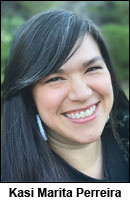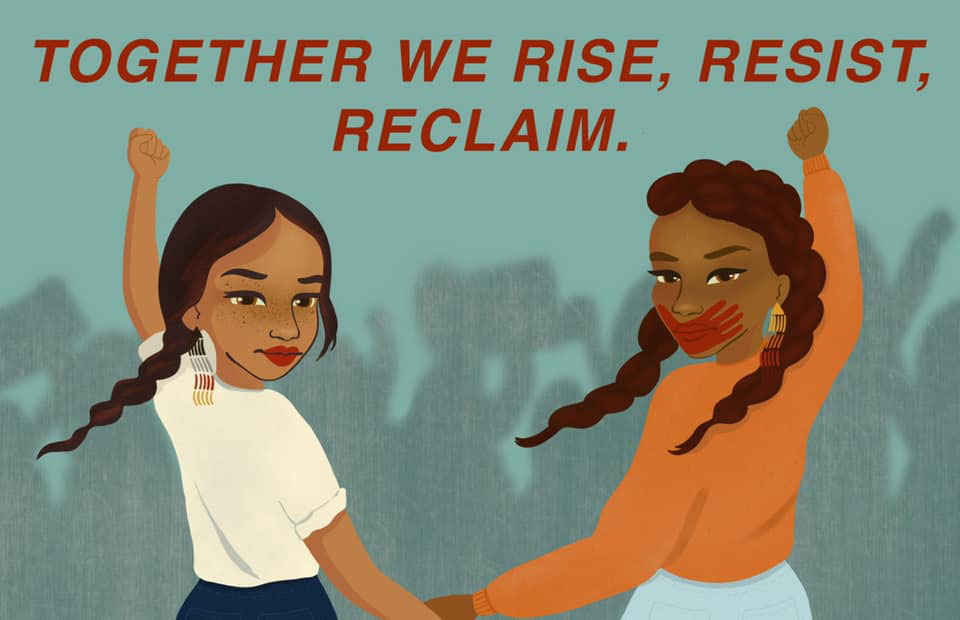OPINION
Celebrate Indigenous Peoples’ Day by learning, taking action
By KASI MARITA PERREIRA
(Oct. 12, 2020) — As a mixed Tlingit, Chinese and white woman who grew up here in Seattle, my people and my culture are my medicine. As Indigenous people, we are still here despite generations of proclamations and policy meant to remove us, and it is this shared history that unites us.
Indigenous Peoples’ Day may not be a recognized holiday in many of our workplaces, but the federal holiday, Christopher Columbus Day, means a day off if you work for the government or banks. 45 even issued a proclamation today, reinforcing his attempts to erase our shared history, in the name of “patriotic education.”
We can’t fall for this. Instead, let’s use today to educate ourselves with the truth, and celebrate the many different Indigenous and Tribal nations we have here in Washington. One of the most important lessons I have learned and continue to learn from Black leaders and organizers: if you want to undue centuries of oppression, listen to the people and ancestors who experienced it first-hand, trust their leadership and their solutions. As a labor organizer, this rang true time and time again. If we really wanted to tackle a problem at a workplace, it was the workers who had the real solutions, not the boss.
One of the most common questions I get is how to do a land acknowledgement. The 2019 WSLC Resolution on Race & Labor 3.0 connected the fight for liberation and equity for all:“The WSLC will begin this effort to acknowledge what has been buried by honoring the truth that we are standing on the ancestral lands of many Indigenous, Tribal communities and/or First Nations people and the WSLC will begin all public events with a Tribal acknowledgement.”
No matter where you live, you are on indigenous land, in many cases shared or disputed territory of multiple tribes. A website and mobile app developed by First Nations organizers is a great resource www.native-land.ca. Or check out #LandAcknowledgement #Hotline 1-907-312-5085. If you text this number with your city and state, it texts you back whose land you are on.
Once you learn what tribal land you are on, a quick search online makes it pretty easy to find preferred land acknowledgement, if your local tribe has one, video instruction as well as other ways you can support. For example, the first people of Seattle have been fighting for federal recognition for decades and have launched the Real Rent Duwamish campaign.
As we move more events online, more land acknowledgements are being done via video, in email signatures and in Zoom chats. However, we must go beyond land recognition, so I invite you to join me in learning more and taking action in solidarity with 8 things you can do on Indigenous Peoples’ Day 2020:
1. Indigenous Peoples’ Day Online Celebration, hosted by Canoes Seattle, today from noon to 1:30 p.m. Join here.
2. United Indians Indigenous Peoples’ Day today at noon. Join here.
3. Indigenous Peoples Day and Coming Out Day, hosted by by Evergreen Longhouse and Evergreen Tacoma, today from 2 to 4 p.m. Join here.
4. Children’s Book Launch: The Journey of the Freckled Indian: A Tlingit Culture Story. Join the Conversation About Indigenous Identity & Solidarity today at 3 p.m. Join here.
5. Learn more about Indigenous organizations in your area, and consider donating to their efforts. For example, the Chief Seattle Club, a Native-led human services agency and day center dedicated to serving urban Native people experiencing homelessness, is having its annual fundraiser Oct 19-23. Learn more here.
6. Missing and Murdered Indigenous Women (MMIW): 2019 WSLC Resolution #19 brought attention to the MMIW epidemic in Washington, which has the second-most opened unsolved MMIW cases of any state in the U.S. The city of Seattle has the highest rate of MMIWG as compared to other cities in the United States, according to a study by Urban Indian Health Institute, a project of Seattle Indian Health Board.
7. Solidarity with Black Women, Black Leaders, Black Lives: Visit, donate and sign up to make sure that we continue to #sayhername.
8. Make your voice heard: Ready, set, VOTE!
 Kasi Marita Perreira is Director of Racial and Gender Justice for the Washington State Labor Council, AFL-CIO.
Kasi Marita Perreira is Director of Racial and Gender Justice for the Washington State Labor Council, AFL-CIO.






